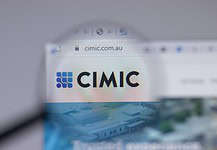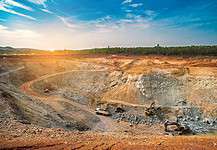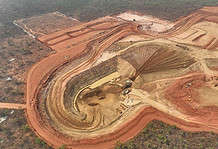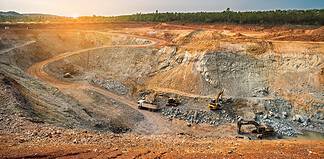BOTH the 2019 half year results and March quarter results for South32 bode well for the year ahead, with chief executive Graham Kerr confident of an achievable production guidance for 2019.
“For the full year we’ve increased production guidance at Illawarra Metallurgical Coal by 7 per cent with production guidance unchanged for all other operations,” he said.
“We’ve also lowered unit cost guidance for most operations as we maintain operating discipline and benefit from a stronger US dollar.”
Saleable production at Illawarra for the March quarter increased by 68 per cent and 2033kt to 5Mt in the nine months ended March 2019, and was set to produce 6.5kt as it started on the extraction of new panels at both Appin and Dendrobium in the June 2019 quarter.
The increased production guidance was attributed to operational improvements at the site – specifically improved longwall performance, after the completed longwall moves at Appin and Dendrobium performed strongly.
The two longwalls would be operated in parallel from late 2020 and a substantial uplift in development rates at Appin would be required to sustain the dual operation.
South32 chief operating officer Paul Harvey said that development rates at Illawarra were a prime focus for the management team on site in the lead-up to the longwall moves, and that stockpiles had been established in late 2018 to account for the slight decrease in production.
“During the course of the past six months, the management team have improved their development rates by 45 per cent, which is significant improvement with quite a good pipeline of development opportunities, programs, projects and options available to the team that they’re continuing to work on,” he said.
“We’ll set targets in our plans that we believe we can achieve, we do have to improve – but the trajectory we’re on is really encouraging and we’re making great progress and we’ll keep focussed on delivering that.”
Mr Kerr indicated that finding staff to work on the site’s continuous mining machines had been a challenge and that previous issues with labour agreements at Illawarra had been resolved with the Dendrobium Mine Trades and Operators Enterprise Agreement during the December 2018 quarter.
A new Appin Trades and Operators and West Cliff Coal Preparation Plant Enterprise Agreement was also negotiated during the quarter, which concluded the renegotiation of all major labour agreements at the operation.
Upcoming projects
Mr Kerr said the company was well positioned across all operations for the year.
“At Illawarra, we advanced the Dendrobium next-to-main project into feasibility and we’ve moved closer to approval to explore the southern areas at GEMCO in Northern Australia,” he said.
“We are well positioned entering the second half of the year with net cash at $678 million and group volumes are expected to rise by 5 per cent in the 2019 financial year as our operations deliver more consistent production.
“This is a good position to be in as we look to continue our strong start to the year, reshape our portfolio and build the foundations for future performance.”
South32 had also progressed with its acquisition of the Eagle Downs Metallurgical Coal Project in Queensland.
“We also completed the acquisition of the 50 per cent interest in the Eagle Downs Project during the period, giving us operational control of a fully permitted, partially developed metallurgical coal mine with a 1.1 billion tonne resource in Queensland’s Bowen Basin,” Mr Kerr said.
The company assumed operatorship with the other 50pc interest in the project held by Aquila Resources, a subsidiary of China’s largest steel producer, BaoWu.
The project had the potential to export 4.5Mtpa of coal from one longwall during the first 10 years of full production
“We have commenced feasibility work on the underground long wall project and expect to make a final investment decision with our partner during the second half of the 2020 financial year,” Mr Kerr said.
Subject to the outcome of the feasibility study, South32 intended to construct a multi-seam underground longwall metallurgical coal mine and processing plant with a dedicated rail spur and train loadout facility.
The project was set to benefit from previous investment that had established two kilometre drifts which were around 40 per cent completed at the time of acquisition as well as site infrastructure including water supply, high voltage systems, office buildings, water and sediment dams – all of which could potentially support accelerated development of the site.
The final investment decision for Eagle Downs was scheduled for late 2020.
Meeting demand
South32 has managed the balance of energy and metallurgical coal well; improving production for Illawarra Metallurgical Coal, acquiring the Eagle Downs Metallurgical Coal Project and planning to broaden ownership options for its South Africa Energy Coal asset.
“We remain on track to transform the ownership of South Africa Energy Coal with binding bids expected in the June 2019 quarter,” Mr Kerr said.
“Once acceptable bids are received and evaluated, we expect to reclassify South Africa Energy Coal as an asset held for sale on the balance sheet and a discontinued operation in the income statement.”
Illawarra Metallurgical Coal was well positioned in Australia to take advantage of the strong market demand for both metallurgical and energy coal.
Around 20pc or 1300kt of its total 6500kt production guidance was energy coal with the remaining 80pc, or 5200kt, as metallurgical coal.
By end of financial year 2020 this was expected to increase to 5800kt, along with a slight decrease to 1200kt energy coal.
To put this in perspective, metallurgical coal demand in Australia was anticipated to grow from 275mt in 2017 to 372mt by 2030, and in March 2019 the NSW Minerals Council reported that both kinds of coal exports from the state have doubled since 2001 from 75mt to 164mt –an increase of 118 per cent.
“Coal is our state’s most valuable export so it’s great for the NSW economy that demand for our high quality resources remains strong,” NSW Minerals Council chief executive Stephen Galilee said.
He said the strong global demand for high quality coal was being driven by growing energy demand as well as trends in industrialisation and urbanisation in the region.
“Our coking coal is also in demand for its role in the production of the steel needed to help drive economic development and growth,” he said.








































